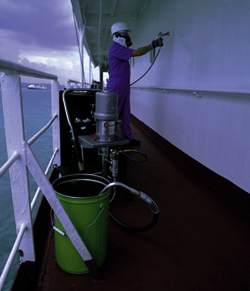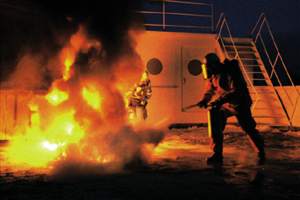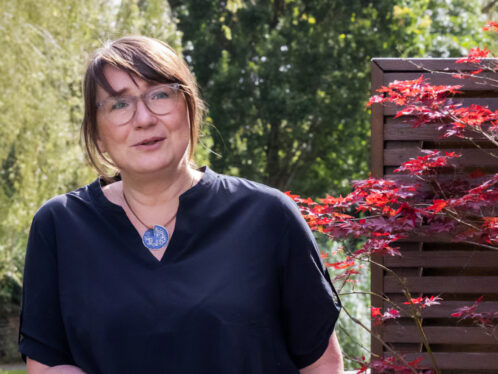
A part in every port
For ship operators, Norwegian Unitor is a one-stop shop for technical shipboard supplies. Each of its 8,500 standard products is tested for the marine environment.
Summary
Strategic alliance
In line with its ambition to be a single source of technical supplies for the international merchant fleet, Unitor forged a strategic alliance with SKF in June 1997 to become the authorised bearing distributor for the marine business.
Through Unitor’s Technical Ships Supply initiative, ships now have access to a full range of marine-quality SKF products at any port in the world. These include 390 bearing types, more than 80 bearing tools and some 22,000 individual bearing variants.
Aboard ships, the most commonly used bearings are deep groove ball bearings, which represent about 80 percent of Unitor’s bearing stock. Other common bearings found in engine rooms and on deck machinery include self-aligning ball bearings, angular contact ball bearings and cylindrical roller bearings.
An 85,000-dwt (tonnes dead weight – the maximum weight of cargo and fuel together) tanker typically carries a stock of about 160 types of bearings for emergency repairs.
“Instead of dealing with a multitude of distributors, suppliers and ship chandlers, ship owners and operators have now only to approach Unitor for the supply of bearings worldwide,” says Stefan Karlsson, managing director of SKF Norway.
According to Lloyd’s register, there are 34,000 merchant ships plying the world’s oceans. Half of these purchase technical supplies from Unitor, a global marine-supply company with headquarters in Oslo, Norway.
Like a global convenience store for the international merchant fleet, Unitor sells a range of 8,500 standard products and services to ship owners and operators. This includes gases and gas cylinders, fire-fighting systems, welding equipment, pumps, spray-painting equipment, medical supplies, air compressors, cleaning chemicals, fire-fighting outfits, fuel-oil treatments, hand tools, bearings and fittings. Most are Unitor branded. All are specially tested for standing up to the tough demands of the marine environment.
Unitor’s depots and service stations are spread around the world’s busiest coastlines like a string of pearls. The company has 84 offices and 173 agents serving 969 ports in 80 countries, and a central warehouse in Rotterdam. In whatever port a ship may call – Yokohama, Houston, Cape Town, Hamburg – Unitor guarantees quick delivery, sometimes within the hour, of vital technical shipboard supplies. In 1997, the company made more than 210,000 deliveries to 17,000 ships. These ranged in size from a single O-ring to complete fire-detection and fire-extinguishing systems.
“Our customers, the ship owners and operators, are stationary, but the point of delivery could be anywhere in the world,” says David J. Tandy, Unitor’s vice president of sales and marketing, from corporate headquarters in Oslo. “The Unitor concept is to provide standard products of a known quality at a standard price.”
Global competence
Some ships literally have hundreds of suppliers for everything from deck equipment to marine chemicals. In contrast, Unitor’s strategy and competitive advantage is that it buys products in bulk from manufacturers and sells them directly to ship owners, thereby making the distribution chain as lean and cost-effective as possible. The global availability of Unitor’s products also cuts down on purchasing and associated administration costs for ship owners.
Although the shipping industry is notoriously cyclical and one of the first to feel the chill of global economic downturns, Unitor is steadily taking market share. In addition, the company’s single-sourcing business philosophy has helped to more than quadruple turnover in the past decade – from 513 million kroner in 1986 to NOK 2.5 billion (US$357 million) in 1998.
But one of the main reasons for Unitor’s stability, even in the face of sinking freight rates, is that the company is forever developing new products and services to offer its customers. In fact, the company’s role is moving beyond one of a pure supplier to more of a technical problem-solving operation. “To mirror what vessel operators are looking for is the key to our business,” said Unitor President and Chief Executive Officer Frode Berg in an interview in the shipping daily Lloyd’s List in January 1998.
One step ahead
For example, Unitor’s Marine Contracting division, while accounting for only 5 percent of turnover, specialises in insulating liquid natural gas (LNG) carriers. Insulation is a very important part of the vessel as it limits evaporation and loss. The company’s Spiral Generation system, which spins insulation around the large spherical tanks, is installed on about half the world’s fleet of LNG carriers.
In the not-so-distant future, ship owners and ships at sea will be able to order online from Unitor. With the help of new IT systems, Unitor is currently working to streamline important processes such as order handling, purchasing and logistics. In addition, they’ll have access to databases to monitor what they’ve purchased and when. The system will also remind operators when it is time to service the ship’s fire extinguishers, for example.
In April 1998 Unitor launched another new service, the Technical Ships Supply (TSS) initiative. Developed according to extensive market research, the service makes available worldwide a standard assortment of welding and fluid-handling equipment, 1,900 hand tools, bearings and tools from SKF, and packing seals. In all, TSS covers more than 3,000 items for deck, engine maintenance and repair.
Last but not least, Unitor’s refrigeration division hit the market in early 1997 with a modular and standardised heating, ventilation and air conditioning (HVAC) system. Designed to ensure the proper climate for personnel, machinery and cargo aboard merchant vessels, more than 50 HVAC systems have so far been installed on new buildings and retrofits in Norway, Russia, Spain, China and Poland.
Unitor was founded in 1936 by Einar Torbj¢rnsen, a Norwegian who believed that ships should carry welding equipment onboard to make repairs while under way. The biggest problem, however, was that welding-gas cylinders differed from port to port and were not interchangeable. So Unitor introduced a standardised cylinder exchange system. By 1939, vessels could purchase welding gases from Unitor at 18 ports worldwide.
Today, a Unitor gas cylinder delivered in Singapore is identical to one delivered in Rio. Unitor’s range of gases for marine use includes oxygen, acetylene, argon, nitrogen, breathing air and refrigeration gases – all with standardised fittings and colour codes. To ensure that these are used correctly, Unitor operates welding schools in Oslo, Manila and Piraeus to train about 1,500 sailors a year. Its handbooks and literature about marine welding, especially the Unitor Welding Handbook, are industry bibles.
According to Unitor Technical Manager Jarle S. Jensen, helium is the only gas in the world that has not been standardised. Fittings, threads and maintenance routines on helium cylinders differ from supplier to supplier. “We have not had helium in our assortment, so there is no international standard,” he says.
But that is about to change. As part of its efforts to become a major supplier to cruise ship operators, Unitor will launch in 1999 a range of cruise-specific products such as swimming-pool products and helium gas. “The helium is to fill balloons for parties,” says Jensen. “Up to now, cruise ships have had a hard time getting it.”
Alexander Farnsworth
a feature writer based in Stockholm
photos UNITOR






